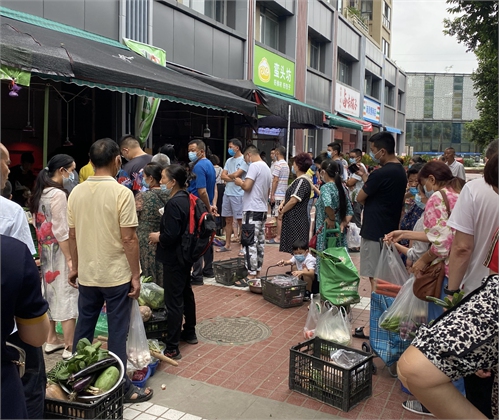
Chengdu Photo:VCG
Some 21.2 million residents of Chengdu, the capital of Southwest China's Sichuan Province, have been asked not to leave their homes unless necessary from 6 pm on Thursday, which puts the city under near-static management, to cope with a surging number of COVID-19 cases as the city has recorded 766 COVID-19 infections as of press time during the latest spike.
Chengdu health authorities announced on Thursday that 106 new confirmed local cases and 51 asymptomatic infections have been recorded on Wednesday, with most of the new cases linked to the infections at a swimming pool in a gym on August 25. At present, there are 198 high-risk areas and 183 medium-risk areas in the city.
"The spread of this round of epidemic is fast, with much hidden transmission, scattered cases, and a wide range of risk places. The epidemic situation in the whole city is extremely complex and severe," Yang Xiaoguang, director of the health commission in the city, said at a press conference on Thursday.
According to the press conference, the genetic sequencing results of this outbreak have shown that it is Omicron variant BA.2.76, which is homologous to the virus strains circulating in many places in and outside the province recently.
In response, local health authorities asked all residents to undergo a four-day series of nucleic acid tests from Thursday to Sunday.
Two airports in Chengdu have cancelled a large number of flights on Thursday due to the epidemic. As of 12:25 am, nearly 60 percent of flights at Chengdu Shuangliu International Airport and nearly 80 percent of flights at Chengdu Tianfu International Airport were cancelled, as displayed on information provider VariFlight.
According to epidemiological investigation, a swimming pool and a water park have been associated with multiple cases in this round of outbreak. "Chengdu experienced extreme heat some time ago, which led to more water activities among local residents, resulting in a large number of people gathering and having close contact with each other. Also, inadequate personal protective measures during the leisure activities have increased risk of social transmission," said local authorities.
Residents have been required not to leave their homes starting from 6 pm Thursday, except for those seeking medical treatment and other special needs. Each household can arrange one person to go out once a day to buy daily supplies with the negative nucleic acid certificate within 24 hours, read the statement from local authorities.
Other than this, except for public service enterprises that guarantee residents' basic lives and the basic operation of the city, other institutions will be temporarily closed, and restaurants are also required to cancel dine-in services.
The frequency of bus and subway operations will be adjusted, and people with special needs will be required to take public transportation with a 24-hour negative nucleic acid certificate.
Several Chengdu residents reached by the Global Times on Thursday said that this round of outbreak has not had a severe impact on their daily lives, and all necessary daily supplies can be purchased or provided by the government.
A Chengdu resident surnamed Chen told the Global Times that "my grandparents live alone in the city center, and we usually visit them every day. Our biggest concern now is that we won't be able to visit them if we are quarantined at home, so we have decided to immediately pick up my grandparents to live with us."
A citizen surnamed Zhong who lives in the city's Chenghua district said that she is not allowed to leave her residential compound but can still hang around within the compound, and each household can send one person out every day to purchase daily necessities.
"The supermarkets are still open and we were told there is no need to stock up on food because there are 900,000 tons of vegetables ready for daily supplies and the government will deliver vegetables to the front doors of residential compounds," Zhong said.
Also, Chengdu's education bureau said in a statement on Tuesday that the start of the fall semester of schools in the city will be postponed. Schools and universities across the city will adopt online courses to ensure the teaching and learning can continue normally.
A college student in Chengdu surnamed Lei told the Global Times on Thursday that her university had postponed the start of the semester and will start online teaching. "Since the beginning of COVID-19, many universities, including ours, have had both online and offline courses, and students are getting used to it."
Health experts stressed the importance of the detection of infections in a timely manner. They suggested that in addition to focusing on screening people from risky areas entering the region, it is necessary for big cities with good economic conditions to stick to normalized nucleic acid testing according to the epidemic situation.
Although regular nucleic acid testing is a bit costly, it is affordable in big cities, and it has been proved to be effective in monitoring the epidemic, experts believe.
Huang Ziting contributed to this story


